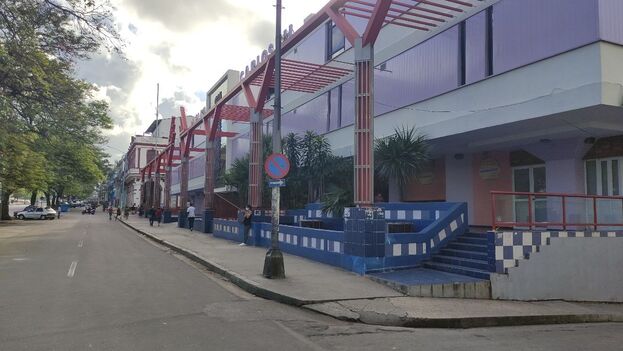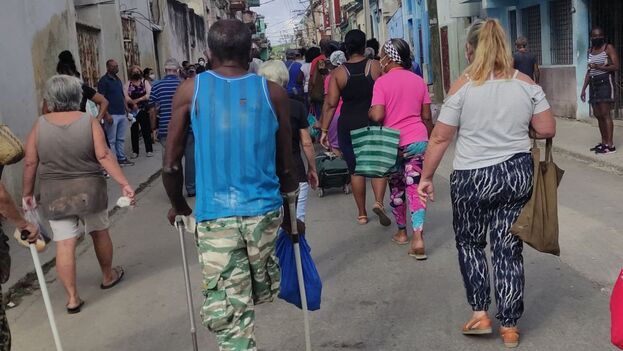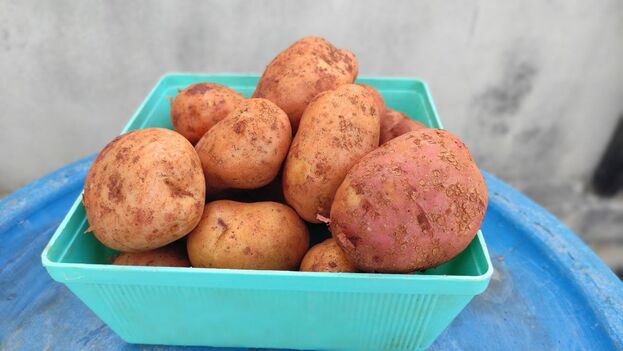
![]() 14ymedio, Juan Diego Rodríguez, Havana, 25 February 2021 — For the second time in less than a year, the Carlos III Plaza, in Centro Habana, has closed its doors again due to a Covid-19 outbreak. The largest shopping center in the Cuban capital will not provide service “until further notice” and at least seven store workers have tested positive for the disease, an employee told 14ymedio.
14ymedio, Juan Diego Rodríguez, Havana, 25 February 2021 — For the second time in less than a year, the Carlos III Plaza, in Centro Habana, has closed its doors again due to a Covid-19 outbreak. The largest shopping center in the Cuban capital will not provide service “until further notice” and at least seven store workers have tested positive for the disease, an employee told 14ymedio.
“We have been told that they will open at the weekend but it has not yet been confirmed, and it seems almost certain that at first there will be no food services of any kind to avoid crowds within the premises,” adds the worker who preferred anonymity. “They are doing PCR on all of us and, at the moment, we are at home waiting for the results.”

Outside the premises, on the centrally located Carlos III street, several uniformed members of the Prevention Troops, with their red berets, guard the area, but do not give customers details about the epidemiological situation. “Closed until further notice,” one of the soldiers repeated this morning to an elderly woman who was inquiring about the reasons for the suspension of service.
On one side of the building, which occupies an entire block, a military vehicle, a van, is located from the early hours of the morning just where, until a few days ago, the long line began to enter the supermarket located on the ground floor of the Plaza. Last week the place was abuzz with people waiting, but today it is deserted.
“Better not even ask, because if you start to investigate a lot they will look at you with a frown, as if they were expecting to buy” some chicken and a little oil. “A few minutes later, a radio placed in a nearby doorway could be heard playing this Thursday’s update with the Covid-19 figures on the Island.
Of the total of 670 new positive cases announced on Thursday, 364 are in Havana, which continues to be the epicenter of the current upturn in the pandemic on the island. According to Deputy Prime Minister Roberto Morales Ojeda, “from the explosion of cases” positive for Covid-19 in recent months, the territory “no longer has the capacity to isolate all the contacts” of the infected.
Quarantine zones and closures of markets or public institutions contrast with long lines to buy food, which have become even longer as shortages increase.

This same Thursday, on Jesús Peregrino Street, a few yards from the Plaza de Carlos III, dozens of people waited to buy the potatoes from the rationed market that have begun to be distributed in the neighborhood at three pesos a pound. With two pounds per capita, the arrival of the tuber has become an event due to the fall in the supply of other products such as rice and bread.
“You have to have something to put with the little you can put on the plate,” complained Amarilys, a 79-year-old retiree who started the line before “the sun came up.” Despite the authorities’ calls for the most vulnerable people not to go out in the streets, most of those waiting were elderly and there were also some people with disabilities.
Others, however, have not had to line up to get some potatoes. “It hit the black market first,” says a young man from a balcony. In the same area yesterday, five-pound bags of potatoes began to be sold at 120 pesos. The price can go up if the customer wants the purchase delivered to an area closed by confinement, as is the case of the Aramburo block between Zanja and San Martín, which has been closed with metal quarantine fences.
____________
COLLABORATE WITH OUR WORK: The 14ymedio team is committed to practicing serious journalism that reflects Cuba’s reality in all its depth. Thank you for joining us on this long journey. We invite you to continue supporting us by becoming a member of 14ymedio now. Together we can continue transforming journalism in Cuba.
